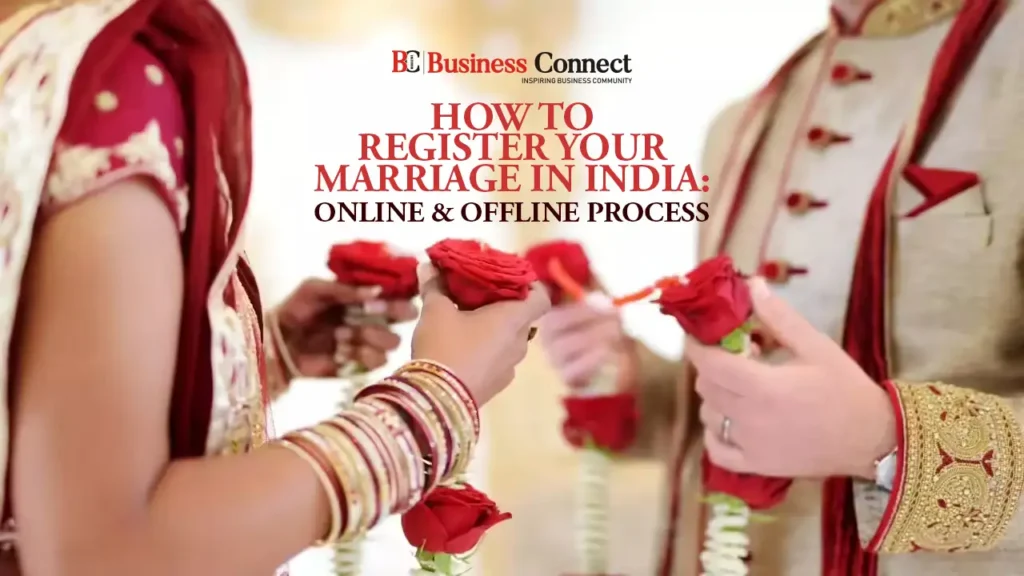How to Register Your Marriage in India: Step-by-Step Guide for Online & Offline Process (2025)
By Fathom Legal Advocates and Corporate Consultants
Registering your marriage is not just a formality it’s legal proof of your union that holds significant value in property claims, visa applications, insurance, inheritance, and more. While traditional ceremonies are culturally important, they don’t serve as valid legal documentation unless the marriage is officially registered under the law.
Let’s break down the step-by-step process, both online and offline to get your marriage registered in India under the applicable law.
1.Choose the Correct Marriage Law. Marriage in India can be registered under two major statutes:
- Hindu Marriage Act, 1955 – For Hindus, Sikhs, Jains, and Buddhists
- Special Marriage Act, 1954 – For interfaith marriages or when either party doesn’t fall under Hindu law
If you marry under Hindu customs and rites, registration under the Hindu Marriage Act is sufficient. But for court marriages or interfaith unions, you must register under the Special Marriage Act.
2. Prepare Required Documents Here’s a checklist of documents you’ll need for marriage registration:
- Proof of age (birth certificate, passport, PAN, SSC mark sheet)
- Address proof (Aadhaar, voter ID, utility bill)
- Passport-size photographs of both partners
- Wedding invitation card or wedding photographs (if already married)
- Certificate from priest or witness (for Hindu Marriage Act)
- Affidavit of marital status
- In case of widow/divorcee: death certificate or divorce decree
- Witnesses with ID proof (usually 2–3)
3. Online Registration – Available in Many States Several states now offer online portals for marriage registration. For example:
- Delhi: edistrict.delhigovt.nic.in
- Maharashtra: aaplesarkar.mahaonline.gov.in
- Tamil Nadu: tnreginet.gov.in
Steps:
- Create login and fill marriage registration form
- Upload documents
- Choose preferred Sub-Registrar Office and appointment date
- Attend appointment with originals and witnesses
While the application is online, physical presence is usually required for verification.
4. Offline (In-Person) Registration Process If online services are not available in your area, visit the nearest Sub-Registrar’s Office with all original documents. Submit Form A (Hindu Marriage Act) or Form A/B (Special Marriage Act), along with fees.
Under the Special Marriage Act, a 30-day public notice is mandatory before solemnization. Anyone can object during this time. If no objection is received, the marriage is solemnized at the office itself in the presence of three witnesses.
5. Fees and Timeline
- Registration fee varies by state: usually between ₹100–₹1,000
- Certificate is issued the same day (Hindu Marriage Act) or after 30 days (Special Marriage Act)
6. NRI/Foreign National Marriages If one spouse is a foreign citizen or NRI, additional documents are needed:
- No objection certificate (NOC) from their embassy
- Valid visa and passport
- Address proof in India
Some states also require continuous stay of at least 30 days prior to application.
7. Common Issues to Avoid
- Name mismatches across documents
- Incomplete or unsigned forms
- Choosing wrong Act (Hindu vs Special)
- Missing witnesses
If documents are in regional language, provide notarized translations.
8. Legal Validity and Benefits
- Legally proves marital status for banking, insurance, passport, property
- Protects spouses’ rights in case of separation or death
- Mandatory for interfaith marriages and court marriages
- Helps in applying for spouse visa abroad
Conclusion – registering your marriage is a simple but essential legal step that provides official recognition and protection. Whether done online or offline, the process ensures your rights are secure in matters like property, visas, and inheritance. By choosing the correct law and keeping documents in order, you can avoid delays and ensure a hassle-free registration.



